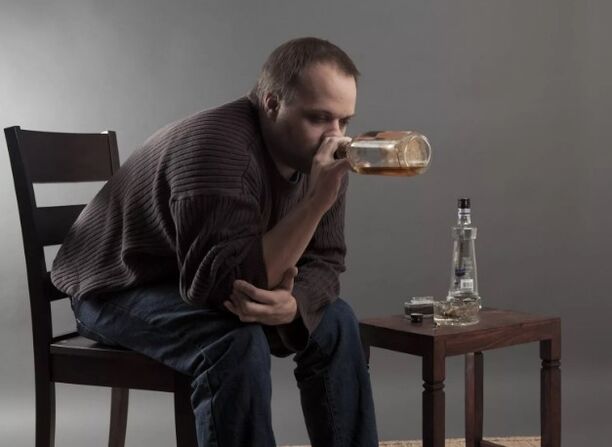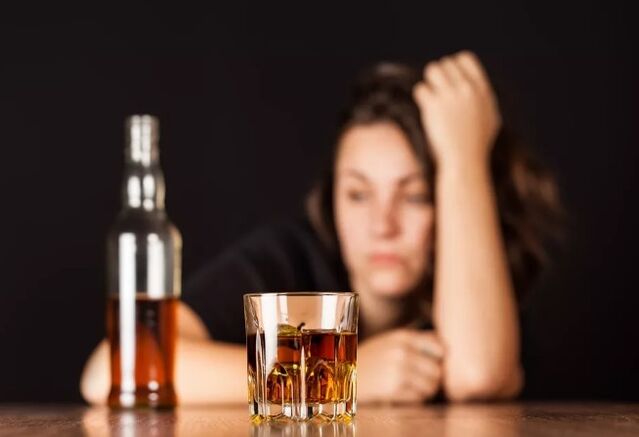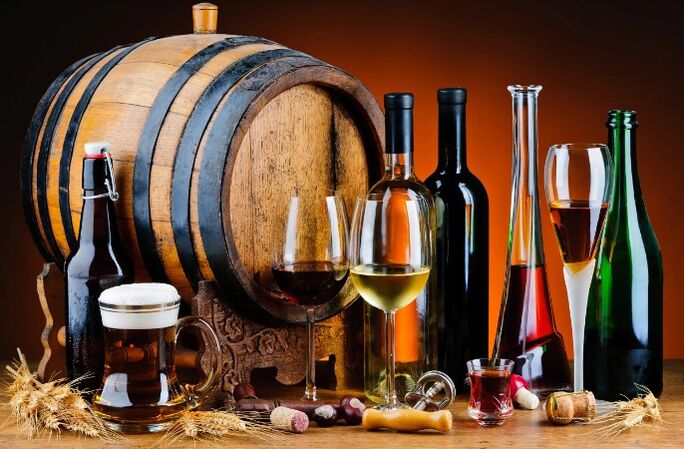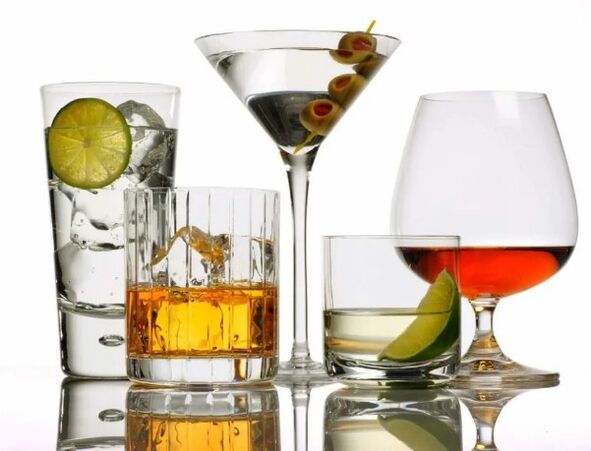Alcoholism is one of the most difficult problems in modern society.Alcohol and its effects on the body are the subject of discussions among scientists of various specialties who are trying to establish the reasons for the rapid increase in incidence, ways to save people from this disease, as well as risk factors for the development of a tendency to regularly drink alcohol.

At first, changes in internal organs induced by alcohol are not characterized by a strong disruption of their functionality.But over time, the influence of alcohol on a person increases, leading to acute disturbances in the activity of the body's vital systems and breaking the chain of complex mechanisms of its neurohumoral regulation.
Features of the mechanism of action
How does alcohol affect the body?Once in the human stomach, alcohol is absorbed into the bloodstream almost instantly.Few people know, but alcoholic beverages begin to decompose in the oral cavity, so the blood is saturated with alcohol from the first minute of contact with the body.From this moment the harmful effects of alcohol on human organs begin.About 20% of alcohol is neutralized by the liver enzyme alcohol dehydrogenase, which deactivates substances containing alcohol toxins.
Most alcohol continues to act in the small intestine.It is from here that alcohol enters all watery areas of the body, in order to be partially excreted through sweat, urine, saliva, etc., and partially oxidizes and accumulates in most organs for several days.During this period, alcohol acts as a poison, slowly poisoning all cells of the body, affecting the development of a person, the state of his psyche and the functionality of internal structures.
The effects of alcohol on systems and organs
The harmful effects of alcohol on the human body are expressed not only in dysfunction of the brain and liver.Alcoholism has a negative effect on all organs and systems of the human body.In short, regular consumption of alcoholic beverages completely destroys the normal functioning model of the patient's body, has a detrimental effect on its proper functioning and is one of the main causes of mortality among people of working age.
Impact on the psyche
Each of us probably knows how alcohol affects the human psyche.Heavy drinkers may experience hallucinations, overwhelming feelings of anxiety, apathy and prolonged depression.Alcoholics lose themselves completely.These people become antisocial, pay little attention to their appearance, they stop caring about everyday human worries, taking care of their family, etc.
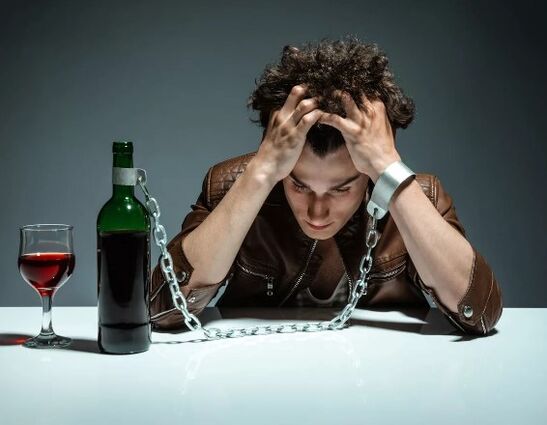
The consequences of alcohol consumption on the human body
Each stage of addiction has certain symptoms and distinctive characteristics.There are 4 in total.
For the initial phasecharacterized by a gradual increase in the dose of alcohol consumed, the formation of dependence and the influence of alcohol on the psychological level.
At the second stagethere is a desire to increase the dose of alcohol.Dependence develops on a physical level.
On the third- destruction at the physical and psycho-emotional level, formation of dementia.
The fourth stage cannot be treated and leads to the death of the addict.Failure of body systems and death occurs.
25 reasons to quit alcohol
Many people see nothing wrong with drinking alcohol in the evenings, on weekends or on holidays.But few people have a sense of proportion and will.And a seemingly harmless hobby turns into a bad habit.This article provides 25 reasons to give up alcohol, discusses the harm of alcohol and its effects on the human body.
- Alcohol is the cause of many diseases, wickedness, indiscipline, waste of talents, senseless conflicts and poverty.
- It is difficult to find a greater evil than alcohol, which would so persistently and mercilessly disrupt the health of millions of people, so dramatically destroy all human tissues and organs (especially the cerebral cortex), the mind and personality of a person, ultimately leading him to premature death.The insidiousness of this poison lies in the fact that the serious consequences of alcohol harm do not occur immediately, gradually, imperceptibly.
- The influence of alcohol on a person's life is evidenced by the following facts: 50 percent of accidents, 1/3 of suicides, 80 percent of deaths from cancer of the oral cavity and esophagus are due to alcohol abuse.
- As a result of research carried out using the latest technologies, Australian scientists have concluded that alcoholics and moderate drinkers experience a gradual decrease and shrinkage of the brain.One glass of alcoholic beverage destroys 1,000 to 2,000 cells in our brain.These data were confirmed in 95% of alcoholics and 85% of moderate drinkers.
- Studies have proven that the probability of drinkers giving birth to a healthy person is 15 times lower than that of non-drinkers, the mortality rate of their children is 5 times higher, and morbidity is 3.5 times higher (note that we are only talking about drinkers, not alcoholics).Alcohol affects children even before they are born.Even in families that drink alcohol moderately, children are born with slow development, mentally underdeveloped and even dead.Due to their addiction to alcohol and drugs, American women alone give birth to thousands of premature babies every day.Drinking parents are the worst thieves, stealing from their own children the happiness of future discoveries, the happiness of living a full life (according to F.G. Uglov).
- Experiments carried out on chicken eggs showed the following: 160 eggs were placed in an incubator in a barn, in the basement of which alcohol was brewed.Alcohol vapors affected the eggs.When the time came, the following result was obtained: only half of the chicks hatched, 40 of them were not viable, 25 were mutants (without beak, without claws, etc.).
- If one person’s genetic code is damaged, the entire generation is in danger.Nowadays, 96% of genetic code violations are caused by various drugs (alcohol, cigarettes, other drugs).
- Alcohol as a drug is harmful in any form and in any dose to the human body, because it acts like morphine or marijuana, that is, it creates the illusion of goodness and happiness, while causing irreparable damage, like any other poison.
- According to the WHO (World Health Organization), one in three people on earth dies from causes related to alcohol consumption, and one in five people dies from causes related to smoking.This means that for these reasons we are losing in Russia almost one and a half million people a year, which is 20 times higher than the number of victims of the Hiroshima atomic explosion.
- Prohibition successfully worked in Russia at that time for more than 10 years.During this period, the number of sick people decreased, prisons were emptied, peace returned to families and prosperity appeared in homes.All of this data can be verified using a large medical encyclopedia and numerous scientific works of the time.
- The assurances of some heavy drinkers that they feel relief after drinking are pure deception caused by paralysis of the centers of attention and self-control.The patient, after taking a dose of alcohol, falls into a state of euphoria and everything, even his own illness, appears rosy.In fact, drinking alcohol in any quantity only aggravates the process and harms the person.
- It is not for nothing that they say: “A river begins with a stream, and intoxication begins with a drink.”» Let us think about this fact.From the point of view of the contagiousness of the habit of drinking alcohol, it is not drunkards and alcoholics who are the most dangerous, because, looking at them, no one will want to imitate them.More contagious is the example of those who drink “in moderation”, “in a cultured manner”, who drink “while observing a ritual”, etc.Unfortunately, our media has “worked hard” to present the holiday in a broader and more attractive way.It's rare that a film takes place without drinks, lavish celebrations and toasts.People drink enthusiastically after these toasts, almost mystically hoping that an empty glass or shot glass is the surest way to fulfill their fondest desires.And children become spectators and witnesses, then complicit in alcohol consumption, because they unconsciously imitate their parents.
- Many researchers have shown that if children are invited to play at a birthday or wedding, they reproduce and copy the attributes of an adult feast in games - they sit at a common table, open bottles, clink glasses, make toasts and walk with unsteady steps.A survey of 100 boys in one of the kindergartens showed that 97% of children described alcohol poisoning correctly.From kindergarten age, the idea of alcohol begins to form as a special and obligatory companion of celebrations and meetings, an attractive symbol of adult life.By the age of 11-12, adolescents form fairly stable stereotypes regarding their attitude to drunkenness.In this, they copy their parents and relatives.
- Teenagers assert themselves based on who drinks the most.Euphoria is cultivated in such endeavors.Adolescents project their ideas of courage, masculinity, and maturity onto alcoholism;they encourage each other to see who is drunker, who screams, who laughs or squeals louder, who behaves more brazenly.There is a lot of ostentatious, demonstrative, hysterical behavior.Loud music is usually played, increasing destructive behavior.
- According to statistics, people who drink live on average 10-15 years less.People who have been smoking for 8 years.Which directly shows the harm of alcohol on the human body.
- The short answer to the question of why people drink is: they drink because it is a drug that is widely advertised and sold freely.They drink because alcohol has become a legal drug and is sold cheaply.
- There is a misconception that alcohol should be consumed “for fun.”In fact, fun and laughter are very important moments in a person's life.They give rest to the brain, distract thoughts from everyday worries, thereby strengthening the nervous system and preparing it for new work and worries.But laughter and fun are only useful in cases where they occur in a sober person.There is not and cannot be fun in the scientific and reasonable understanding of this state.Drunk "pleasure" is nothing more than excitement under anesthesia - this is the first stage of anesthesia, the stage of excitement that surgeons observe every day when giving the patient other drugs (ether, chloroform, morphine, etc.), those that are identical in their action to alcohol and, like alcohol, are drugs.This stage of excitement has nothing to do with pleasure, and after it the nervous system does not rest.On the contrary, instead of rest, depression sets in with all its consequences (headaches, apathy, weakness, reluctance to work, etc.).Which is never observed in sober pleasure.Alcohol is therefore not a friend, but an enemy of pleasure.This eliminates the time a person spends on pleasure and relaxation.Instead, he has a headache and is tired.Alcohol acts in the same way when you are tired.A day off is given to a person so that he can rest physically and mentally and, with new strength and desire to work, get down to business after resting.
- Alcohol creates the illusion of stress relief.In fact, tension in the brain and throughout the nervous system remains, and when the hops fade, the tension turns out to be even greater than before drinking wine.But to this is added a weakening of will and weakness.
- An innate need to drink beer, wine, vodka, etc., people don't do that.If there were no alcoholic beverages and drinking traditions in the world, one could live peacefully without them and not harm their body and loved ones.
- To make a conscious choice “to drink or not to drink,” you need to know how alcohol affects our body.“Advertisers” can invent any legend about the usefulness of alcohol.In television commercials, they call beer “correct”, “invigorating”, “for real men”, they try to “link” alcoholic products with the sexual, patriotic, national and high-status characteristics of people.In order not to be mistaken, you need to have objective information yourself and learn how to counter advertising.
- After drinking alcohol, the amount of urine excreted increases (diuresis), that is, water and salts are lost.After intoxication, there is a strong thirst, “pulling” for brine and mineral waters.A brief systematic review of the real effects of alcohol on all types of metabolism in a living organism leads to one conclusion: all types of metabolism are disturbed.It is this combination of “killer” effects that determines the antiseptic effect of ethyl alcohol and should constitute an obstacle to its use as a drink.
- The term “alcoholic beverages” is incorrect.“Drinks” must have nutritional value and contain substances involved in nutrition.These include proteins, fats, carbohydrates, minerals and vitamins.They are not found in alcohol.There is very little in cognacs, wines and beer.To get their daily amount, you need to drink an amount of these liquids, the alcohol content of which is several times higher than the lethal dose.
- For example, you can buy a car with the money you spend on alcohol.You can calculate for yourself how much money you spend on alcohol over the months and years.
- Reference is often made to studies carried out by foreign scientists, for example several institutes in Munich, proving that beer helps fight many diseases.First of all, it should be noted that all of these studies were conducted with financial support from the alcohol industry.Therefore, such results circulate in the media, but they are difficult to find in serious scientific journals, because these journals usually ask the authors to indicate the source of funding for the research, and if it is the alcohol or tobacco industry, then the publication of such studies is perceived as a sign of bad taste.
- You have the power to get rid of another addiction, become free and happy!
